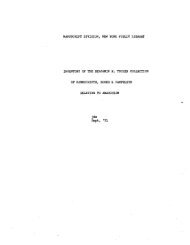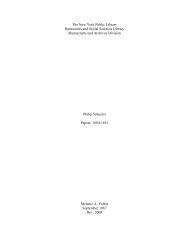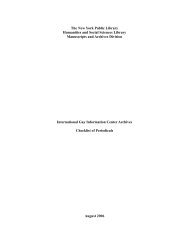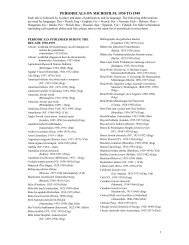pdf available - Multiple Choices
pdf available - Multiple Choices
pdf available - Multiple Choices
You also want an ePaper? Increase the reach of your titles
YUMPU automatically turns print PDFs into web optimized ePapers that Google loves.
132 LUBOML<br />
buildings, with round ledges in front; they were<br />
built in a beautiful style and were painted white.<br />
The stores occupied only one corner of the square.<br />
Brisk Street bordered it on the north and<br />
Chelm Street on the west (Chelm Street was also<br />
called Rimatch Street). This street was long and<br />
densely built. The street began at the marketplace<br />
and was full of stores selling shoes, haberdashery,<br />
dishes, food, etc. There was also a fish<br />
store near Chelm Street.<br />
Where the street ended, outside the town, it<br />
intersected another street that both Gentiles and<br />
Jews called Biselovska. It was at this intersection<br />
that the Jews who lived in the vicinity would wait<br />
to buy from peasants everything they were bringing<br />
to town: from grain and eggs to tobacco. Beyond<br />
that point were some of the smaller gentile<br />
houses, with small gardens and fruit trees. At the<br />
very end of the long streets were the fields that<br />
surrounded the shtetl.<br />
To the right of Brisk Street was another large<br />
row of old-fashioned stores. Each house had a<br />
little store in the front, and a deep, large residence<br />
in back. This neighborhood also had taverns, as<br />
well as state-licensed stores for cigarettes and<br />
tobacco. These small stores lined both sides of the<br />
street till the intersection with Polish Street, occupied<br />
mostly by Poles. Polish Street was about a<br />
mile long.<br />
An orchard stretched over the entire length of<br />
the right side of the street. The gardens belonged to<br />
the town's landowner, Kampyoni, who lived<br />
nearby. He own ed all the stores on that street and<br />
the storekeepers paid him an annual rent. Actually,<br />
the storekeepers had those stores for generations,<br />
having either inherited them or received<br />
them as dowry for their children. They even had<br />
the right to sell the stores, but they had to pay rent<br />
to the rich landowner.<br />
Of all the streets, the one that has been<br />
etched in my memory was Polish Street, for it<br />
had the school I attended as a child. In general, this<br />
street was different from the others; it had fewer<br />
houses, which therefore did not crowd each other<br />
as much as in other streets. In the city park, one<br />
side was occupied by the garden with its delicious<br />
pears and winter-apples. On the other side<br />
was a row of government buildings, spaced far<br />
apart. They housed the offices of the municipality,<br />
the Department of Finance, the Catholic<br />
church and the Greek Orthodox church. Trees<br />
and greenery surrounded the buildings, unlike<br />
the other streets of the town.<br />
On the Sabbath or on leisure days, the townspeople<br />
promenaded on this street; it was their<br />
favorite spot for a stroll. This whole area, with its<br />
fragrant air, enticed young people out of their<br />
dwellings. The older ones, as well, would come out<br />
for a stroll here, after they had eaten their Sabbath<br />
cholent and had a nap. The younger ones were not<br />
too lazy to go beyond the town, to the nearby Boris<br />
Woods.<br />
Oh, if only that little wood could reveal the<br />
secrets of the loving young couples who used to<br />
sneak into the thickets, to lose themselves in their<br />
fantasy of a better future when they were married<br />
and would not have to hide their feelings; and<br />
meanwhile they would steal a kiss or two as a<br />
deposit!<br />
I was born just in the "right" time. World War<br />
I was almost over. It was in fact over, but other<br />
troubles soon beganepidemics. Typhoid fever<br />
was rampant in our area, leaving few Jewish<br />
homes untouched. I was then nine months old.<br />
We lived near the Talmud Torah, in a tiny room,<br />
rented from Yitshak the Wagoner.<br />
As my father told me later, my mother had<br />
just finished kneading dough in a small trough<br />
half the size of a small keg, which had a cover,<br />
when suddenly someone ran into the house, shouting<br />
loudly to my mother that she should go and<br />
help my uncle because he was very ill.<br />
Not thinking of the danger, she quickly ran to<br />
him in order to sponge him down with alcoholthe<br />
only cure known at that time. My mother<br />
caught the disease right then and there, and died<br />
after one day's sickness.<br />
After this terrible tragedy, my father decided<br />
to leave the little Talmud Torah street and even<br />
the shtetl itself, where the epidemic was raging<br />
because of overcrowded conditions. His sister<br />
Sosye lived in the village of Vishnyeve, somewhat<br />
less than two miles away. The village had plenty<br />
fresh air as well as a garden in front of every<br />
house. And his sister was also able to help him to<br />
take care of the little orphaned children.







